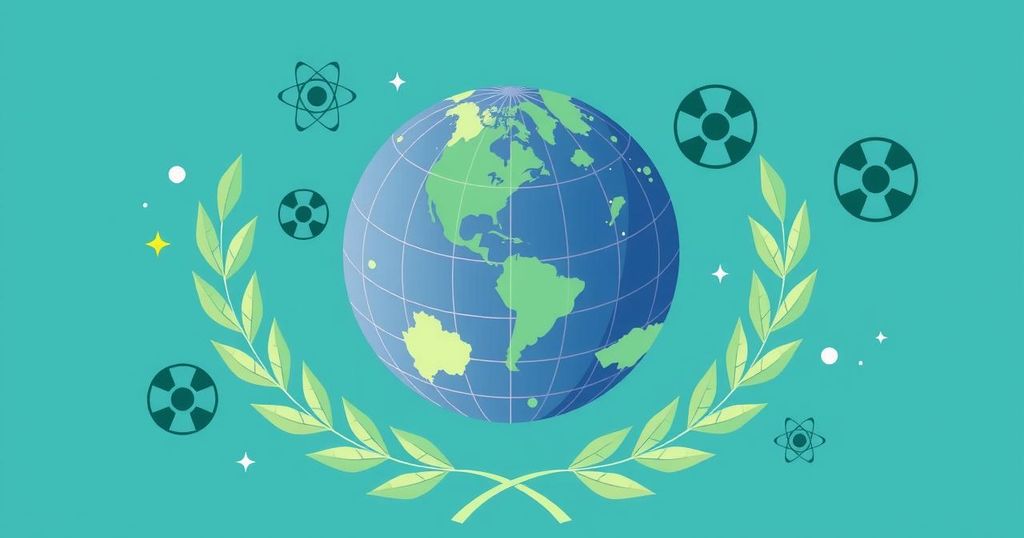Global news
ALI KHAMENEI, AMERICA, ASIA, BARACK OBAMA, CIVIL DISOBEDIENCE, DONALD TRUMP, FOREIGN POLICY, FOX BUSINESS, FOX BUSINESS NEWS, GLOBALNEWS, INTERNATIONAL RELATIONS, IRAN, ISRAEL, KHAMENEI, NORTH AMERICA, NUCLEAR POLICY, NUCLEAR WEAPONS, OVAL, OVAL OFFICE, TEHRAN, TRUMP, U. S, UNITED STATES, US-IRAN RELATIONS, WHITE HOUSE
Fatima Khan
0 Comments
Trump Appeals to Iran’s Leader for Nuclear Negotiations Amid Rising Tensions
President Trump has contacted Iran’s Supreme Leader, seeking a new nuclear deal to limit Iran’s nuclear ambitions. Although details are sparse and reaction from Khamenei is unclear, Trump’s statements emphasize a preference for negotiation over military intervention, amid escalating tensions in the region and Iran’s enhanced uranium enrichment activities.
President Donald Trump has reached out to Iran’s Supreme Leader Ali Khamenei with a proposal for a new nuclear deal, aiming to curb Tehran’s rapidly progressing nuclear program. This initiative seeks to replace the previous agreement from which Trump withdrew during his first term. Although Iranian state media reported on the letter, there has been no official confirmation of its receipt from Khamenei’s office.
During a recent Oval Office briefing, Trump hinted at the correspondence, stating, “We have a situation with Iran that, something’s going to happen very soon. Very, very soon.” He expressed a preference for negotiating a peaceful resolution while cautioning that military intervention could also be considered should negotiations fail. This position aligns with ongoing concerns voiced by both Israel and the United States regarding Iran’s pursuit of nuclear capability.
In an interview with Fox Business, Trump disclosed that he had written to Iran, saying, “I hope you’re going to negotiate because if we have to go in militarily, it’s going to be a terrible thing.” Despite sending the letter the previous Thursday, he has not elaborated on the specifics of the proposals made therein. Trump’s appeal echoes his earlier strategy with North Korean leader Kim Jong Un, which, while leading to discussions, did not yield concrete agreements.
Iran maintains its nuclear program is for peaceful purposes, despite increasing threats to advance its capabilities in response to U.S. sanctions and regional tensions. Current assessments by U.S. intelligence indicate that Iran has not launched a weapons program but is preparing the groundwork to manufacture a nuclear device if it chooses. Trump has emphasized the necessity of preventing Iran from acquiring nuclear weapons, as evidenced by a recent United Nations report highlighting Iran’s enhancement of its uranium enrichment activities.
Further complicating the situation, under the original 2015 nuclear agreement, Iran’s enrichment capabilities were severely limited. The recent reports indicate a significant increase in Iran’s uranium stockpile, intensifying pressure on Trump as his administration continues to pursue maximum pressure on Iran through sanctions. In previous remarks, Khamenei suggested openness to discussions with the U.S., although his more recent statements indicate a reluctance to negotiate, dismissing talks with America as “not intelligent, wise or honorable.”
It remains uncertain how Khamenei will respond to Trump’s letter, given the historical context of their interaction. Past attempts to communicate through intermediaries have faced rejection, yet the current economic climate within Iran, including a devalued currency and high unemployment, may influence the regime’s willingness to engage in dialogue. Both Israel and Iran continue to be embroiled in mutual hostilities, exacerbating tensions as Trump signals that he would favor diplomatic efforts over military action, although the latter has not been wholly ruled out.
On the same day Trump sent this letter, Iran’s UN mission stated that they had not received any correspondence from Trump, leaving the situation in limbo while regional dynamics continue to shift.
In summary, President Trump’s recent outreach to Iran’s Supreme Leader entails a desire to negotiate a new nuclear deal, reversing his previous stance that led to heightened tensions. Despite potential avenues for dialogue, the Iranian leadership’s past reluctance and ongoing regional conflicts complicate prospects for renewed negotiations. The situation is further underscored by Iran’s considerable advancements in uranium enrichment, which raises the stakes for any diplomatic efforts.
Original Source: globalnews.ca




Post Comment